- Home
- James S. A. Corey
Gods of Risk
Gods of Risk Read online
Gods of Risk
An Expanse Novella
James S. A. Corey
www.orbitbooks.net
www.orbitshortfiction.com
Begin Reading
Meet the Author
Bonus Material
About Orbit Short Fiction
In accordance with the US Copyright Act of 1976, the scanning, uploading, and electronic sharing of any part of this book without the permission of the publisher is unlawful piracy and theft of the author’s intellectual property. If you would like to use material from the book (other than for review purposes), prior written permission must be obtained by contacting the publisher at [email protected]. Thank you for your support of the author’s rights.
Gods of Risk
What kind of problem?” Hutch asked. Even though he was from the settlements near Mariner Valley, he didn’t have the relaxed, drawling accent of that part of Mars. Hutch’s voice buzzed like a radio on just the wrong frequency.
“It’s not bad,” Leelee said, leaping to his defense. “It’s not bad, right, David? Not really a problem. Inconvenience maybe.”
“Inconvenience,” David echoed.
The silence was uncomfortable. David tugged his fingers, pulling each one straight out from the hand until the knuckle popped, then moving on to the next. He was half a head taller than Hutch, but he couldn’t seem to bring his gaze up higher than the thin man’s sternum. In two months, David would be sixteen, but he felt about six. Hutch’s meetings were always in small rooms, away from the main passages and corridors. This one had been a storage hole from the first generation of settlements. The walls were the polished stone of Mars covered with a clear insulative ceramic that was starting to bubble and gray with age. The light was a construction lantern, the burning white of the LED softened and made ruddy by Leelee’s paisley silk scarf draped over it. They sat on metal crates in the cold. Hutch scratched at the scars on his wrist.
“Don’t let it choke you, little man,” Hutch said. It was an old joke between them—David’s family were Polynesian before they were Martian, and between genetics and growing up at barely over a third of Terran g, David was over two meters tall and leaning toward pudgy. “Just say what it is. You got a bad batch, right?”
“No, nothing like that. The batch is fine. It’s just my aunt Bobbie’s come to live with us for a while. She’s always at the place now. Always. Anytime I get home, she’s there.”
Hutch frowned and tilted his head. Leelee put her arm around his shoulder, draping herself close to the man. Hutch shrugged her back but not off.
“She knows you’re cooking?”
“She doesn’t know anything,” David said. “She just lifts weights and watches video feeds all day.”
“Lifts weights?” Hutch asked.
There was an undercurrent of amusement in his voice that made David’s guts unknot. He risked a glance at the thin man’s tea-brown eyes.
“She used to be a Marine.”
“Used to be?”
“Something weird happened. She sort of quit.”
“So not a Marine anymore. And now what is she?”
“Just a fucking inconvenience,” David said. He took a little joy in the profanity. Hell and damn were the worst language tolerated in the Draper house. Fuck would have gotten him yelled at. Worse than that would be unthinkable. “The batch is fine. But it’s going to be harder to get the next one done. I can’t do any of the prep work at home now.”
Hutch leaned back, his laughter filling the air. Leelee’s face relaxed, all the little worry lines vanishing back into the eggshell smoothness of her skin.
“Shit,” Hutch said. “You had me thinking there was trouble for a minute there. Thought I was going to have to tell my people that my best cook fell down.”
David picked up his satchel, fumbled through it, and came out with a rattling plastic jar. Hutch took it, cracked the seal, and poured four or five of the small pink lozenges into his hand, then passed one to Leelee. She popped it in her mouth like it was hard candy. The 2,5-Dimethoxy-4-n-propylthiophenethylamine was a serotonin receptor agonist that broke down into—among other things—a 2,5 desmethoxy derivative that was a monoamine oxidase A inhibitor. The euphoric effects would start to tighten Leelee’s joints and lift her mood in the next half hour. The hallucinations wouldn’t kick in for an hour, maybe an hour and a half, and then they’d last her through the night. She rattled the lozenge across the back of her teeth with her tongue, grinning at him. David felt the first stirrings of an erection and looked away from her.
“You do good work, little man,” Hutch said, taking out his hand terminal. The small chime meant the transfer was done. David’s secret account had a little more money in it, not that he was in this for the money. “Now, this auntie thing. What’s it going to do to your schedule?”
“I’ve still got the lab at school,” David said. “I can sign up for more time there. Seniors get preference, so it won’t be too hard. It’s just—”
“Yeah, no,” Hutch said. “Better we play safe. You tell me how much time you need to make the next batch; that’s how much time you can take.”
“I’m thinking a couple weeks at least,” David said.
“Take them, they’re yours,” Hutch said, waving his scarred hand. “We’re in this for the long haul, you and me. No reason to get greedy now.”
“Yeah.”
The thin man stood up. David was never sure how old Hutch really was. Older than him and Leelee and younger than David’s parents. That gulf of years seemed to fill infinite possibilities. Hutch shrugged on his dust-red overcoat and pulled his brown knit tuque out of a pocket, flapped it once like he was whipping the air, and pulled it down over white-blond hair. Leelee stood up with him, but Hutch put a hand on her bare shoulder, turning the girl toward David.
“You see my girl here back to the land of the living, eh, little man? I got a thing to do.”
“All right,” David said. Leelee pulled her scarf off the lantern, and the dirty little room went brighter. Hutch gave a mocking three-finger salute, then unsealed the door and left. The rule was that Hutch left first, and then ten minutes later David could go. He didn’t know exactly where Hutch went, and if Leelee was here with him, he didn’t care. She leaned against him, smelling like verbena and girl. She was a year older than him, and he could have rested his chin on the top of her head.
“You’re doing all right?” he asked.
“Am,” she said, her voice slushy and soft. “It’s starting to come on.”
“That’s good.” He gathered her a little closer. She rested her head against his chest, and they waited quietly for the precious minutes to pass.
Seven communities—called the neighborhoods—scattered through the northern reach of the Aurorae Sinus made up Londres Nova. The city, such as it was, had burrowed deep into the flesh of Mars, using the soil as insulation and radiation shielding with only ten domes pressing out to the surface. Forty thousand people lived and worked there, carving new life into the unforgiving stone of humanity’s second home. Tube stations made a simple web topology that determined the social forms and structures. Aterpol was the only station with connections to every other neighborhood, and so it became the de facto downtown. Salton was under the biggest agricultural dome and had a surface monorail to the observatory at Dhanbad Nova, and so the upper university and technical clinics were concentrated there. The lower university was in Breach Candy, where David and his family lived. Nariman and Martineztown had been manufacturing and energy production sites in the first wave of colonization, and the displacement that came with new technologies meant both neighborhoods were struggling to reinvent and repurpose themselves. Innis Deep and Innis Shallows each had only a single tube route out, making t
hem cul-de-sacs and havens for the sort of Martian who was almost a Belter—antisocial, independent, and intolerant. An address in either Innis was the mark of an outsider—someone dangerous or vulnerable. Leelee lived in the Shallows, and Hutch lived in the Deep.
As much as the neighborhoods differed, the tube stations were the same: high, arched ceilings bright with full-spectrum light and chaotic with echoes; thin-film video monitors pasted to the walls, blaring public information and entertainment feeds; kiosks selling food and clothes, the latest fads and fashions cycled in and out as regularly as tides. Security cameras looked down on everything, identity-matching software tweaking the video feeds to put names with faces in the crowd. The air always seemed to have the faint scents of ozone and cheap food and piss. The plastic-film flyers always looked the same whether they were announcing yoga classes, lost pets, or independent music acts. David had been to the cities in Mariner Valley and the base of Olympus Mons, and the tube stations had been the same there too. The one unifying cultural product of Mars.
David led Leelee through the bustle of the Martineztown station. He shifted his satchel so that she could put her arm around his. The farther they walked the less steady her steps were. Her arm curled around him like ivy clinging to a pillar, and he could feel the stiffness in her muscles and hear it in her voice when she spoke. Her pupils were dilating with pleasure and the chemical cascade in her brain. He wondered what she was seeing.
“You never try the stuff yourself?” she asked again, unaware that it was the third time.
“No,” David said again. “I’m finishing up my senior labs. There isn’t really time for a night off. Later maybe. When I get my placement.”
“You’re so smart,” she said. “Hutch always says how you’re so smart.”
Ahead of them, near the platform, a crowd of something close to fifty people were chanting together and holding up signs. A dozen uniformed cops stood a few yards away, not interfering, but watching closely. David ducked his head and turned Leelee away at an angle. Maybe if they headed toward the restrooms there would be a way to the platform that didn’t involve walking a tripping girl past the police. Not that the police were paying much attention to the foot traffic. Their attention was all on the protest. The signs were hand lettered or printed on standard-sized paper and glued together. A couple had thin-film monitors playing looped images that fuzzed out to a psychedelic rainbow swirl when the signs flexed.
HIT BACK! and ARE WE WAITING UNTIL THEY KILL US? and EARTH STARTED IT. LET’S FINISH IT. This last slogan was accompanied by a bad homemade animation of a rock slamming into the Earth, a massive molten impact crater looking like a bloody bullet wound in the planet.
The protestors were a mixed group, but most were a little older than David or Leelee. Blood-dark faces and the square-gape mouths sent the sense of rage radiating out from them like heat. David paused, trying to make out what exactly they were chanting through the echoes, but all he could tell was that it had seven syllables, four in a call and three in response. One of the police shifted, looking at David, and he started walking again. It wasn’t his fight. He didn’t care.
By the time they reached the platform, Leelee had gone quiet. He led her to a formed plastic bench that was intended for three people, but was snug with just the two of them. It ticked and popped under his weight, and Leelee flinched from the sound. There were small, distressed lines between her brows. The arrival board listed six minutes for the tube that would eventually get them to Innis Shallows, the seconds counting down in clean-lined Arabic numerals. When Leelee spoke, her voice was tight. He didn’t know if it was from sadness or the expected side effect of the drug.
“Everybody’s so angry,” she said. “I just wish people weren’t so angry.”
“They’ve got reason to be.”
Her focus swam for a moment, her gaze fighting to find him.
“Everyone’s got reasons to be,” she said. “I’ve got reasons to be. You’ve got reasons to be. Doesn’t mean we are, though. Doesn’t mean we want to be. You aren’t angry are you, David?” The question ended almost like a plea, and he wanted to tell her that he wasn’t. He wanted to say whatever words would smooth her perfect brow, and then take her back to her room in the housing complex and kiss her and have her strip off his clothes. He wanted to see her naked and hear her laugh and fall asleep, spent, in her arms. He coughed, shifting on the bench. “You aren’t angry, are you?” she asked again.
The soft tritone sounded.
“The tube car’s here,” he said, forcing a smile. “Everything’s going to be fine. Just relax, right?”
She nodded and tried to pull away from him.
“It’s all red. You’re red too. Like a great big cherry. You’re so smart,” she said. “So you never try the stuff yourself?”
On the tube car, things weren’t better. This leg of the trip was an express for Aterpol, and the men and women on it were older than he was by a decade. Their demographic weight had the public monitor set to a newsfeed. In some well-appointed newsroom on the planet, a thin, gray-haired man was shouting down a swarthy woman.
“I don’t care!” the man said. “The agent they weaponized came from some larger, extra-solar ecosystem, and I don’t care. I don’t care about Phoebe. I don’t care about Venus. What I care about is what they did. The fact is—and no one disputes this—the fact is that Earth bought those weapons and—”
“That’s a gross oversimplification. Evidence is that there were several bids, including one from—”
“Earth bought those weapons and they fired them at us. At you and me and our children and grandchildren.”
The doors slid silently closed and the car began its acceleration. The tubes themselves were in vacuum, the car riding on a bed of magnetic fields like a gauss round. The lurch of acceleration was gentle, though. They’d cover the distance to Aterpol in twenty minutes. Maybe less. Leelee closed her eyes and rested her head against the back of the car. Her lips pressed thin and her grip on his arm tightened. Maybe they should have waited for her to take the pill until she’d gotten to someplace quieter and better controlled.
“And Earth also provided the tracking data that shot them all down,” the woman on the screen said, pointing at the gray-haired man with her whole hand. “Yes, a rogue element in the Earth military was involved, but to dismiss the role that the official, sanctioned military played—”
“Sanctioned military? You make it sound like there’s a civil war on Earth. I don’t see that. I don’t see that at all. I see Mars under a persistent, existential threat and the government sitting on its hands.”
“Tell me a story,” Leelee said. “Talk to me. Sing me a song. Something.”
“I’ve got music on the hand terminal if you want.”
“No,” she said. “You. Your voice.”
David tucked his satchel between his feet and turned toward her, dipping his head down close to her ear. He had to hunch a little. He licked his lips, trying to think of something. His mind was blank, and he grabbed at the first thought that came through him. He brought his mouth to the shell of her ear. When he sang, he tried to be quiet enough that no one else would hear him.
“Good King Wenceslas looked out on the feast of Stephen…”
Leelee didn’t open her eyes, but she smiled. That was good enough. For ten minutes, David went on, quietly singing Christmas carols to Leelee. Some he got into and didn’t remember the right words, so he just made things up. Nonsense that fit the rhythm of the music, or nearly did.
The detonation was the loudest thing David had ever heard, less a sound than a physical blow. The car pitched forward, rattling against the walls of the tube, throwing Leelee into him and then back. The lighting flickered, failed, and then came on in a different color. They were stopped between stations. The monitors clicked to a pinkish-gray as they rebooted, then glowered back to life with the emergency services trefoil.
“Is this happening?” Leelee asked. Her irises were tiny rin
gs of brown around deep black. “David? Is this happening?”
“It is, and it’s all right,” he said. “I’m here. We’re fine.”
David checked his hand terminal, thinking that the newsfeeds might tell him what was going on—power failure, rioting, enemy attack—but the network was in lockdown. An almost supernaturally calm male voice came over the public monitors. “The public transport system has encountered a pressure anomaly and has been shut down to assure passenger safety. Stay calm and a maintenance crew will arrive shortly.” The message was less important than the tone of voice it was spoken in, and Leelee relaxed a little. She started to giggle.
“Well this is fucked,” she said and grinned at him. “Fucked, fucked, fucked, fucked, fucked.”
“Yeah,” David said. His mind was already jumping ahead. He’d be late getting home. His father would want to know why, and when it came out he’d been in Martineztown, there’d be questions. What he’d been doing there, who had he been seeing, why hadn’t he told anybody. All around them, the other passengers were grumbling and sighing and arranging themselves into comfortable positions, waiting for the rescuers. David stood up and sat down again. Every passing minute seemed to relax Leelee and shunt that tension into his spine. When he caught a glimpse of his reflection in the glass of the tube doors, the boy looking back seemed furtive and scared.
Half an hour later, the emergency hatch at the end of the car creaked, popped, and opened. A man and a woman in matching blue security uniforms stepped in.
“Hey, folks,” the man said. “Everyone all right? Sorry about this, but some jackhole broke the vacuum seals. Whole system’s going to be down for about six hours, minimum. Some places longer. We’ve got service carts out here that can take folks to transport buses. Just line up single file, and we’ll get you where you’re going.”
Leelee was humming to herself as David drew her into line. He couldn’t get her to Innis Shallow and get back home. Not with the tubes down. He bit his lips and they moved forward one at a time, the other passengers vanishing through the emergency hatch and into the temporary airlock beyond it. It took forever to reach the front of the line.

 Leviathan Wakes
Leviathan Wakes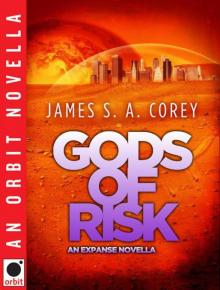 Gods of Risk
Gods of Risk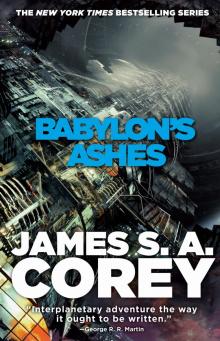 Babylon's Ashes
Babylon's Ashes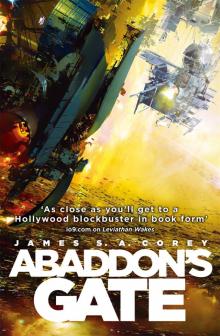 Expanse 03 - Abaddon’s Gate
Expanse 03 - Abaddon’s Gate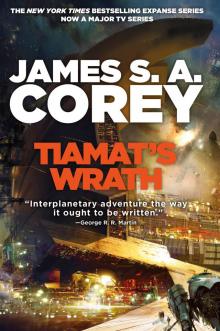 Tiamat's Wrath
Tiamat's Wrath Persepolis Rising
Persepolis Rising The Butcher of Anderson Station
The Butcher of Anderson Station The Churn
The Churn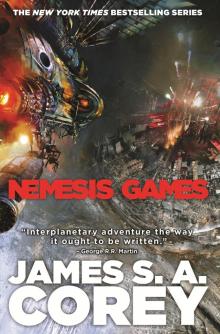 Expanse 05 - Nemesis Games
Expanse 05 - Nemesis Games Strange Dogs
Strange Dogs Honor Among Thieves: Star Wars
Honor Among Thieves: Star Wars Cibola Burn
Cibola Burn Caliban's War
Caliban's War The Vital Abyss
The Vital Abyss Auberon
Auberon Persepolis Rising (The Expanse)
Persepolis Rising (The Expanse) Caliban's War: Book Two of the Expanse series
Caliban's War: Book Two of the Expanse series Leviathan Wakes: Book One of The Expanse
Leviathan Wakes: Book One of The Expanse Cibola Burn (Expanse)
Cibola Burn (Expanse) Strange Dogs (Expanse)
Strange Dogs (Expanse) The Vital Abyss: An Expanse Novella (The Expanse)
The Vital Abyss: An Expanse Novella (The Expanse) Leviathan Wakes e-1
Leviathan Wakes e-1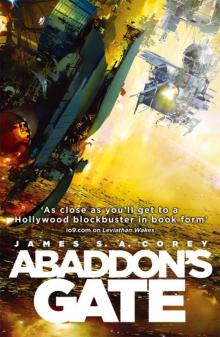 Abaddon's Gate e-3
Abaddon's Gate e-3 Caliban;s war e-2
Caliban;s war e-2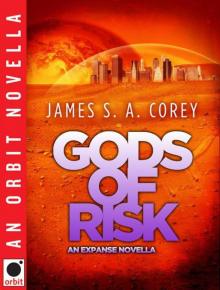 Gods of Risk: An Expanse Novella
Gods of Risk: An Expanse Novella Honor Among Thieves: Star Wars (Empire and Rebellion)
Honor Among Thieves: Star Wars (Empire and Rebellion)